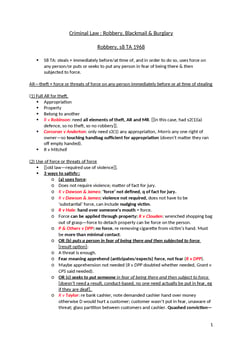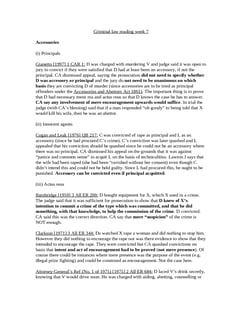R v Nedrick [1986] 83 Cr.App.R 267
Judgement for the case R v Nedrick
Table Of Contents
KEY POINTS
In murder cases, if it's not clear from a simple direction, the jury should understand that they can't infer intention unless they're convinced that death or serious harm was almost certain due to the defendant's actions and the defendant knew this. The decision lies with the jury based on all the evidence presented.
-
Intent can be deduced if these two conditions are present:
The outcome was nearly certain due to the actor's actions; and
The actor was aware of this near-certain outcome.
FACTS
The appellant held a grudge against Viola Foreshaw and, following threats to "burn her out," he went to her house. He poured paraffin through the letter-box and onto the front door, igniting it without warning.
The house burned down, resulting in the death of Viola's 12-year-old son, Lloyd. The appellant initially denied involvement but later confessed to police, emphasising he didn't intend for anyone to die and claiming he only sought to frighten her.
JUDGEMENT
Appeal allowed.
COMMENTARY
The judgement strikes a balance between recognizing the importance of intention in criminal law and the necessity of clarifying its boundaries. It acknowledges that foreseeing a highly probable result can be tantamount to intending that result, while avoiding the potential overreach of criminal liability.
ORIGINAL ANALYSIS
Nedrick poured paraffin into a woman’s letter box and started a fire, as a result of which one of her children had died. He protested that he did not want anyone to die.
The judge directed the jury that if death had been the highly probable result they should convict on murder.
He was convicted and appealed. The appeal was allowed since the judge had equated foresight with intent, when in fact foresight is evidence of intent. Therefore to convict based on foresight is only acceptable where the consequence is appreciated as inevitable by the defendant, so that no other conclusion can be found except that he intended what he did.
The charge of murder was substituted for one of manslaughter.
RELATED CASES
For Further Study on R v Nedrick

A collection of the best GDL notes the director of Oxbridge Notes (an O...
Need instant answers? Our AI exam tutor is here to help.
Ask questions 🙋 Get answers 📔 It's simple 👁️👄👁️
Our AI is educated by the highest scoring students across all subjects and schools. Join hundreds of your peers today.
Get StartedSimilar Cases
Related Product Samples
These product samples contain the same concepts we cover in this case.
| Criminal Law | Homicide Notes (20 pages) |
| GDL Criminal Law | Mens Rea Notes (9 pages) |
| Criminal Law | Mens Rea — Intention Recklessness And Negligence Notes (24 pages) |

 Since 2010, Oxbridge Notes has been a trusted education marketplace, supplying high-quality materials from top achievers at universities like Oxford, Cambridge, LSE, Harvard, and Yale.
Since 2010, Oxbridge Notes has been a trusted education marketplace, supplying high-quality materials from top achievers at universities like Oxford, Cambridge, LSE, Harvard, and Yale.